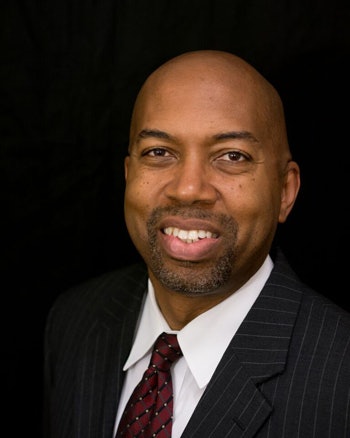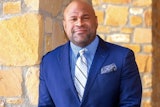Throughout his youth, Dr. Bill Pink had one academic goal. “I wanted to leave my mark on every school that I left, and so I wanted to have my name up on the wall,” says Pink, who was unanimously voted in November to become the next president of Grand Rapids Community College in Michigan.
At Grand Rapids, he’ll not only be memorialized as a college president, but as the first African-American to hold the position at the 100-year-old institution.
 Dr. Bill Pink (Photo courtesy of Grand Rapids Community College)
Dr. Bill Pink (Photo courtesy of Grand Rapids Community College)“This, to me, is hopefully blazing a trail for others who will come after me and who I hope and pray will be much better than what I can be,” he says.
Growing up in Texas, Pink’s family of seven lived with very little financial means, but his mother and father knew how to make ends meet in spite of their financial situation.
As a first-generation college student, he used his passion for playing basketball to help fund his higher learning, which began at York College in Nebraska. In 1987, he graduated with an associate degree, and went on to earn a bachelor’s in education from Oklahoma Christian University in 1990.
That year, he became the head men’s basketball coach at York College — the first African-American junior college men’s basketball coach in Nebraska history.
“What I thought was going to be my life goal was reached right off the bat,” he says, adding that he continued his dream of coaching at various institutions over the next decade.
While teaching and coaching, Pink furthered his education by earning a master’s in education at the University of Central Oklahoma in 1995.
Later that year, he moved to Portland, Oregon, to start the first intercollegiate men’s basketball program at the recently opened Cascade College.
During his last year at Cascade, he added the position of assistant to the president to his list of responsibilities. “That’s when I first got a taste of what this idea of a presidency was all about,” he recalls.
From there, he set his sights past coaching, hitting a point in his career where he thought, “If you want to be a catalyst for change, you have to put yourself in places where you are able to do that, where you’re able to actually call the shots to an extent.”
In 1998, he moved back to Oklahoma to become a full-time faculty member at Oklahoma Christian University, while also pursuing a doctorate degree. In pursuing this degree, he held on to something that his father said to him while in graduate school. “He started calling me Dr. Pink. That, to me, was a motivation to one day make it a true statement — I wanted to bring that to fruition.”
And he did, in 2004, earning a Ph.D. from the University of Oklahoma.
Over the next several years, Pink intentionally took on a variety of administrative roles. In order to be a good leader, he rationalized, “It was important to be able to have that vision of what other people are doing and what they go through every day. I think people respect you more when they know that you’ve walked in their shoes.”
Pink has also been passionate about building relationships with students and millennials, particularly Blacks and Latinos. “I try to make sure that they have some of those forward-thinking thoughts going through their minds in terms of what they can be and then go down the line of saying so how are you going to get there,” he says, explaining that the “secret sauce” in his own life has been determining his goals and creating clear paths toward them.
In 2015, Pink became vice president and dean of workforce development at Grand Rapids. “I realized that a deep dive of workforce development is something that was missing in my portfolio,” he says, pointing to positions in athletics, student services, academic affairs, faculty, dean, and vice president up to that point.
In less than two years, he won the board’s nomination to lead the institution. “As president of Grand Rapids Community College, I have this great and wonderful institution that is an agent to change people’s lives,” he says, adding how truly humbling it is to take on the role.
As he prepares to take the position, Pink will engage students, staff, faculty, and the community. “I am not a good leader if I can’t be with our people — I’ve got to spend time with them because I need to hear their voices when there’s a decision to be made,” he says.
Another priority, he says, is building a college that is responsive and relevant to all stakeholders. “If we lose our relevancy, then we’re in trouble — so all of our processes and programs need to be relevant and responsive to our people.”
Looking toward the future, Pink says his continued mission is to prepare students for success in other academic pursuits or the workforce throughout the region.
“I’ve always thought that it’s important that, whatever the situation, you leave your place better than it was when you got there.”















